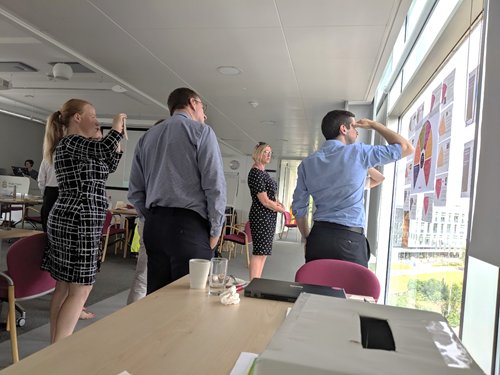Essex Communities: People Powered Places
We held the third series of our “Essex Communities” event on the 1st of August at Anglia Ruskin University. The event was done in collaboration with Nesta and was based on the theme” People Powered Places”.
Essex Communities is one of eight system-wide projects developed by Essex Partners in early 2018 to support the delivery of the Essex Vision ambitions. It is sponsored by Ian Davidson and Gavin Jones.
The purpose of the event was for participants to focus on exploring the future dynamics of the relationship between citizens, civil society and public services, and the role of citizen powered approaches in designing and building new communities. The event achieved its mission, as we were able to attract 52 participants from
WE HAD TWO MAIN OBJECTIVES:
TO SHAPE THE FUTURE: we wanted participants to consider the impact that growth will have across public services.
TO BE CHALLANGED: we wanted to engage all public services, and all public service professions in debate and discussion about shaping new places to secure positive outcomes.
The event was opened by Gavin Jones, Essex County Council’s Chief Executive Officer, and the Essex Communities sponsor. It was then followed on by an ice breaker and workshop facilitated by Nesta.
The workshop allowed participants to explore the role of people-powered approaches to design, build and sustain new communities.
The first part of the workshop involved the use of examples and case studies. The idea was that by sharing stories of where other organisations have created a movement of people powered places, attendees would be inspired and hopefully learn from both the successes and failures.

The second part of the workshop was focused on the theory and methodologies behind the people powered case studies. This was important as enabled the attendees to see an end goal and work backwards to understand the steps but also encourage them to think about ways it can be applied in their respective organisations.
The last part of the workshop looked at how participants can start to create a people powered place movement in their own organisations by dissecting a utopian or dystopian new community and thinking about what happened to bring this to life.
Attendees were asked to fill three sections within their selected group of 5-7:
- Community Champions
- Co-production of Community Design (Facilitating Engagement)
- Utilising Best Practice Locally
The workshop enabled participants to understand what principles, actions and activities need to happen in the short, medium and longer term.
Following in the spirit of taking action, after the workshop attendees were asked to write down their thoughts on the opportunities and challenges, they identified in implementing a people powered approach in their respective organisations. To ensure engagement, attendees were encouraged to write anonymously on a sticky note to put either in the opportunities or challenges column on the board.
Here are some of the quotes on opportunities identified:
- “Scale of growth needed in area should inspire and encourage people to get involved – can influence big plans & changes”
- “New communities can be developed to attract people to Essex”
- “Do more to make people feel welcome and like they belong when they move to the area- tell them what is going on and how they can be involved at an early stage”
- “Allows more consideration for spaces and how it can have multiple uses”
- “Technology means people can work/run a business from anywhere – can benefit rural communities and reduce strain on infrastructure from the community”
- “Trend towards hot-desking and co-working spaces, also pop-up shops. Can benefit our high streets and ensure the residents have a variety of options”
- “An opportunity to build trusting relationships with the community"
Here are some of the quotes on challenges identified:
- “Knowing who you are trying to attract into the new community”
- “Citizens to trust what is being said by councils/developers”
- “Financial Constraints and Political Instability”
- “Changing cultures of the power dynamic”
- “Issues with housing developed through Permitted Development - how can these become a home for residents in the long term?”
- “Fragmented charity and third sector landscape – hard to navigate and get involved”
- “Essex has a very big mix of different communities & some areas of high deprivation – can be hard to activate people and encourage them responsibility”
The event ended with Nesta and ECC staff giving a closing speech and attendees being asked to fill in a pledge on the postcard to encourage a sense of accountability within participants.
